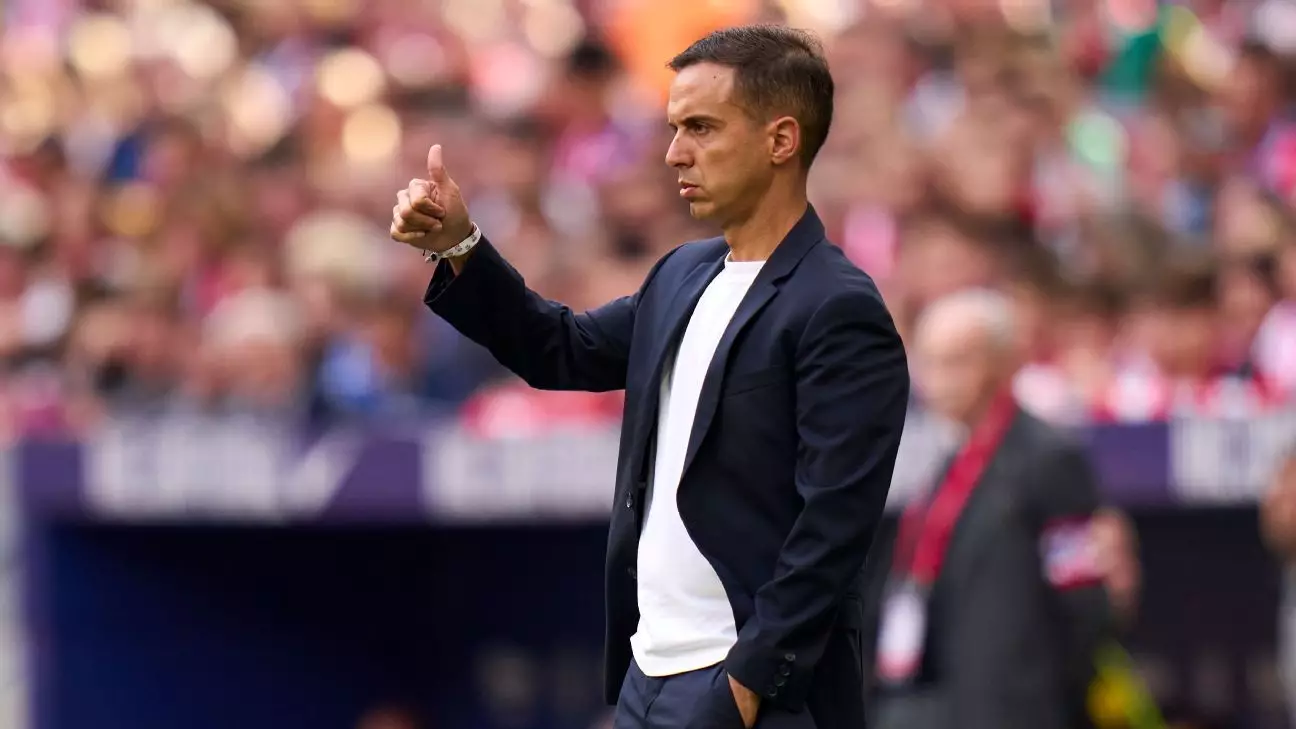The world of football is often characterized by its rich history and the grand narratives woven through the careers of influential coaches and players. Among these narratives are stories of underdogs, those small clubs that rise to disrupt the established order. The most recent tale emerging from LaLiga centers around Leganés, a club that has transitioned from the shadows into the limelight, led by a fresh-faced manager willing to challenge tradition.
This past weekend, an intriguing showdown unfolded between Atlético Madrid’s seasoned coach, Diego Simeone, and Leganés’ Borja Jiménez, marking a stark contrast in experience and accolades. With a storied background that includes over 1,500 professional appearances and an impressive haul of 21 trophies, Simeone represents the epitome of coaching success. In sharp contrast, Jiménez, younger and yet to accumulate any silverware in his managerial career, finds himself in the spotlight as he boldly confronts established figures like Simeone.
The match erupted into a spectacle of emotions, with Jiménez resorting to mock gestures directed at Simeone, accusing him of being overly dramatic regarding officiating decisions. This moment of animosity served as a reminder of the intense passion intrinsic to football, yet it also exposed the insecurities often lurking within the ranks of traditional powerhouses. Such confrontations are not merely entertaining; they underscore the shifting dynamics of the game, where even the newest names can instigate a degree of chaos.
As fate would have it, the game culminated in a dramatic twist. Antoine Griezmann, a stalwart of Atlético Madrid, shanked a penalty kick, sealing the end of their remarkable 15-match winning streak. For Leganés, this victory could not have come at a more opportune moment. It symbolized not just a win over a giant but also reinforced their emergence as a club capable of defying odds. Jiménez’s ability to rally his team against skilled opponents demonstrates an effective tactical approach that emphasizes resilience and determination.
However, it’s important to critique this approach. Jiménez’s coaching style has been described as high-energy, but there remain questions regarding his strategies, particularly against more seasoned clubs. The accolades achieved in the current season come paired with noteworthy weaknesses, including struggles with aerial duels and maintaining possession. As Leganés prepares to face Real Madrid, these vulnerabilities may very well expose the team’s inexperience against a side known for its offensive firepower.
Leganés’ underdog story is profoundly compelling. Their recent history includes a shocking victory against Barcelona, marking a pivotal point in their identity as a competitive force in LaLiga. Since being taken over by Blue Crow Sports Group, the club has undergone significant transitions aimed at enhancing its status in Spanish football. The win against Barcelona was significant not only because of the opponent’s stature but also because it marked a moment that legitimized Leganés as a serious contender, even amidst their relatively meager resources compared to the giants of LaLiga.
Jiménez’s achievements demonstrate a wider trend in football, where significant outcomes sometimes arise from a blend of youthful ambition and tactical astuteness. His ability to adapt and implement a pragmatic game plan has breathed new life into Leganés, a club that previously would have been relegated to noting their defeat amidst elite contenders.
With the quarterfinals of the Copa del Rey looming, Leganés now faces the challenge of taking on a formidable Real Madrid side in a unique twist of fate, where the match will not take place at the intimidating Santiago Bernabéu but at their home ground, Butarque. This shift not only alters the psychological dynamics of the matchup but also highlights the importance of home advantage that could play in Leganés’ favor.
Facing Madrid is no small feat, especially considering the vast differences in resources and experience. However, football is rife with surprises, and Leganés’ recent track record can invigorate their chances. As they step onto the pitch for this historic game, fans will be watching to see if Jiménez’s fiery approach can catalyze another monumental upset.
The tug-of-war between established traditions and emerging talents defines the landscape of modern football. Borja Jiménez’s journey encapsulates the spirit of a regenerate club that has bid farewell to a life spent primarily in the periphery of LaLiga. Despite glaring weaknesses and a lack of experience on his part, his ambition and commitment to cultivating a competitive team stand out. As Leganés prepares to solidify their place in football history, their fight against Real Madrid could symbolize more than just a match. It may represent a broader shift in football, where the growth of new powers challenges old legacies and paves the way for fresh narratives to unfold.

